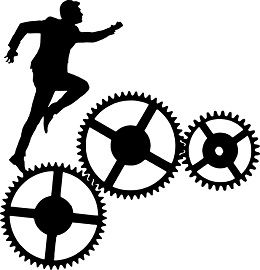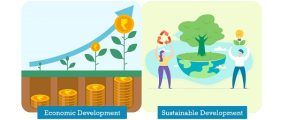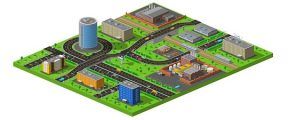 In economics, Human capital refers to the skilled, educated, trained and competent people who are able to produce more human capital, which adds to the strength and wealth of a country or company, and helps in the achievement of goals timely, smoothly and effectively.
In economics, Human capital refers to the skilled, educated, trained and competent people who are able to produce more human capital, which adds to the strength and wealth of a country or company, and helps in the achievement of goals timely, smoothly and effectively.
On the contrary, Human Development is all about increasing the quality of human life, i.e. improvement in the lives of people, opportunities to grow and make better choices.
So, human development is nothing but is the overall development and well-being of the country’s human capital. In this article, we are going to discuss the differences between human capital and human development in detail.
Content: Human Capital Vs Human Development
Comparison Chart
| Basis for Comparison | Human Capital | Human Development |
|---|---|---|
| Meaning | Human capital refers to the economic value of the attributes and abilities of the workforce, which affects the productivity of a firm or nation. | Human development refers to providing more freedom and opportunity to the citizens so that they can lead their life according to their wish and make better choices. |
| What is it? | Intangible asset | Process |
| Concept Developed by | Gary Becker and Theodore Schultz | Mahbub ul Haq. |
| Human beings are treated as | A means to an end | Ends |
| Assumption | Investment in education and health is of no use if it does not increase the value of output. | Human welfare should be increased by way of investment in education and health sector. |
| Considers education and health as | Source to improve the productivity of the workforce. | Vital to the human well being. |
Definition of Human Capital
Human capital, as the name suggests, is that factor of production which is derived from human beings, so as to help in the creation or provision of goods and services. It is the complete set of abilities, with the help of which an organization can meet its goals, which contributes to the country’s economic growth.
Human capital refers to the overall intangible collective resource such as innate and acquired skills, knowledge, intelligence, creativity, experience, competencies and attributes, possessed by the workforce of a nation/firm and which facilitates in the production of something that is economically valuable. Hence, investment to be made in the human capital, with the aim of producing more human capital out of skilled human resource.
There are several sources of human capital formation, which includes:
- Investment in education
- Investment in health
- On the job training
- Migration, in search of better opportunities
- Acquisition of Information
One of the measures of evaluating economic and organizational performance is – How a firm/nation develops and manages its human capital?
In human resource management, the concept of human capital suggests that all the individuals working in the organization are not equal while considering their qualifications and capabilities. However, it can be improved through investing in their education, training and health. It is required by the companies so as to attain its objectives as well as to innovate and develop.
Definition of Human Development
Human development is the development of human beings by extending their freedom, opportunities and choices, and improving their overall well being. It is a science which talks about the reasons for remaining the same or adopting changes over time and the way they stay same or adopt changes.
Human development is all about the infinite choices which humans of a country can make, to live a life they are satisfied with and bettering the conditions so that they can live longer. Therefore, human development adds to the economic growth of the country.
Basically human development is concerned with:
- Providing essential conditions to increase human capabilities so that they can do multiple things
- Using the skills for creative and productive purposes, leisure and actively participating in social, political and cultural affairs.
Human development in a country can be measured through the Human Development Index, also called as HDI. It checks how much the country has achieved in terms of social and economic aspects, such as health, education, the standard of living. These are checked through – Life expectancy, Access to Education and Gross National Income per capita.
Key Differences Between Human Capital and Human Development
Upcoming points will explain the difference between human capital and human development:
- Human capital implies the aggregate skills, knowledge, competencies and other intangible resources possessed by the individuals of a firm/nation, which helps in creating economic value. On the other hand, Human Development is a multifaceted concept, concerning the expansion of knowledge, more alternatives, increase in freedom and fulfilment of human rights.
- While human capital refers to the collective intangible resource of the nation, which is the country’s wealth, human development is a process of improving the living conditions for human beings, which can be measured, over time.
- The concept of human capital is coined by American Economists Gary Becker and Theodore Schultz, in the 1960s. Conversely, the concept of human development is introduced by Pakistani Economist Mahbub ul Haq., in the 1970s.
- Human Capital treats humans as a means to an end, wherein ‘ends’ refers to an increase in productivity. In contrast, Human Development treats humans as an end itself.
- Human capital considers health and education as the essential means to improve the productivity of the workforce. As against, human development takes health and education as vital for human well being, because if they have the ability to work and lead a healthy life, they can make better choices.
- Human capital assumes that investment in education and health is of no use if it does not increase the value of output. On the contrary, Human Development is based on the assumption that human welfare should be increased by way of investment in education and health sector.
Conclusion
In a nutshell, human capital is the sum of all the qualities, abilities and values owned by the workforce and helps in creating economic value. On the other hand, human development is a relatively new concept related to the improvement of human well-being, in terms of their standard of living, opportunities and choices.






Leave a Reply